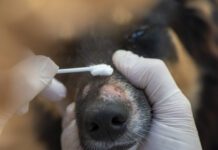Have you hugged your local animal shelter manager lately? He or she could probably use some support about now.
This spring, a crisis developed when the countrys only maker of euthanasia drugs trickled dry due to a regulatory snafu. Many shelters overflowed as employees were forced to use less humane methods of dispatching unwanted dogs and cats.
Now some shelter managers are facing a new challenge: Finding a new outlet for the carcasses of the dogs and cats they have euthanized. The disposal of thousands of tons of companion animal carcases is an enormous problem in this country. For instance, the city of Los Angeles sends some 200 tons of euthanized dogs and cats to a local rendering plant each month.

As gross as it may seem, rendering is considered the best of a limited number of options. The enormous burden cannot be resolved through landfill, and incineration is costly. Rendered carcasses, at least, can be recycled into products such as fertilizers and garden supplements, as well as proteins for poultry feed.
However, rendering plants that produce and sell products for pet food are becoming increasingly reluctant to take on the job of rendering pets. They fear that consumers will reject any pet foods that are suspected of utilizing any substance that could be linked to recycled pets.
This was the case recently, when Valley Protein Inc. of Winchester, Virginia, gave notice to some 75 area animal shelters in Maryland and Virginia that it would no longer provide the carcass removal services it had extended for a fee to area animal shelters for the past 50 years.
The companys president, J.J. Smith, is adamant that the rendered pet products never crossed the line into the pet food products the company makes from other animal sources. Nevertheless, when some of his pet food clients expressed concern about the origin of their products, he felt it was necessary to discontinue the companion animal rendering, lest he lose their far more lucrative accounts. The pet food industry has understandable concerns that the remains of pets could be included in the pet food they sell to their customers, he said.
Valley Proteins decision meant that the areas animal shelters have had to seek out alternative methods of carcass disposal. Most have engaged the services of crematories, but the fees charged by these businesses are about 10 times more than the amount the shelters were paying for disposal by the rendering plant. Unfortunately, this may even result in a reduction in the number of animals that the shelters can afford to house, or shorten the amount of time they have to try to find new homes for adoptable animals.
John Mudd, supervisor of the Tri-County Animal Shelter in southern Maryland, estimates that his shelter disposes of about 90 tons of animals each year. The fee paid to Valley Proteins for that service was about $9,500. The fee charged for disposal of the same amount of animal carcasses by the cremation service he is using now will be in excess of $90,000. Its going to amount to at least a 25 percent overall increase in our total operating budget, which is, of course, outrageous, says Mudd.
Source: Washington Post
——–
Reporting problems with medications can help
drug makers ascertain their true safety
All too often, dog owners regard their pets bad reaction to a medicine or a topical preparation as an isolated incident. Usually, both the dog owner and the veterinarian are so concerned with treating that individual, it never occurs to them to report the incident to either the drugs manufacturer or the FDA. But drug companies (and their Federal regulators) need feedback from the ultimate test population our dogs to ensure continued refinement and development of safe drugs.
If your dog becomes sick, or worsens after taking or being exposed to any drug, immediately take your dog to your veterinarian, and ask her to report your dogs reaction to the drug maker and the FDA. Sometimes the drug manufacturers are already aware of certain problems that may occur, and can discuss suggested courses of testing and/or treatment with your veterinarian.
Dog owners need not depend on the vet to do this, however. Anyone can report suspected drug reactions to the FDA by calling (888) 332-8387 or by using a form on the FDAs website.






